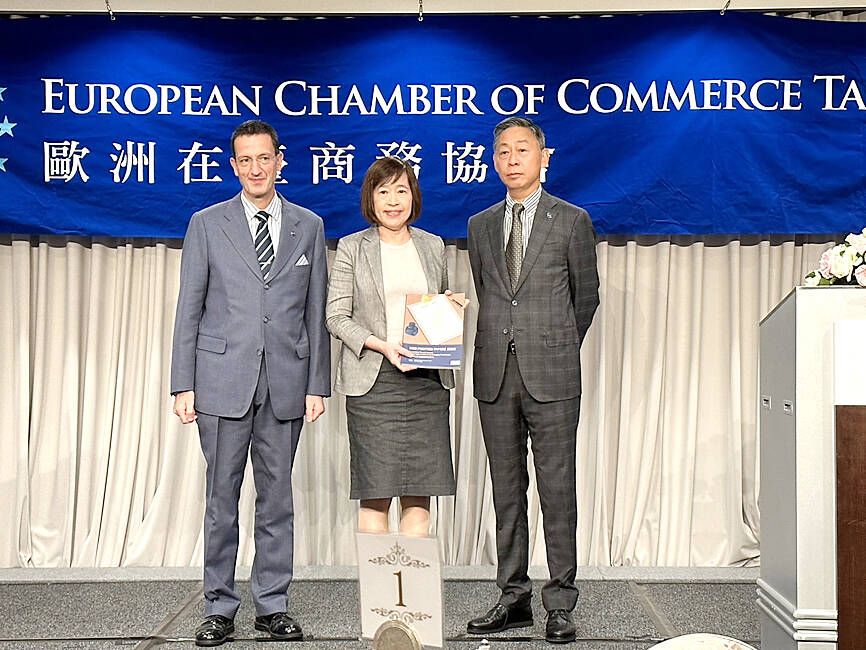The European Chamber of Commerce in Taiwan (ECCT) yesterday called on the government to seize the opportunity to ensure Taiwan’s continued success.
Taiwan has evolved as a beneficiary of an export-driven economy on the back of its contract manufacturing model and should step up its economic resilience and strength by partnering with foreign companies and countries, the chamber said when it released its annual position paper.
“Actions will be needed to speed up Taiwan’s energy transformation, attract and retain talent, enhance the conditions for developing innovative technologies and pursue further internationalization,” the paper said.

Photo: CNA
Countries and companies that are able to adapt to the changing needs of their trading partners and clients are best placed to thrive in the changing order, it said.
Taiwan’s effort to diversify investments and trade has had results, but more could be done in seeking stronger partnerships with like-minded countries, such as those in Europe, it said.
ECCT members welcome the government’s commitment and preliminary road map to achieve net zero emissions by 2050, but found that policymakers have fallen far behind their timetable goals.
For Taiwan to remain an attractive investment destination, the deployment of sufficient green energy is of utmost importance, it said, adding that the reduction of onshore wind and geothermal energy targets runs counter to the government’s objectives.
The rigid insistence on local content requirements and the lack of action to reduce red tape in administrative processes pose obstacles to renewable energy development, it said.
The chamber suggested the government develop all forms of renewable energy to the maximum extent possible, remove the cap on offshore wind energy auction prices, adopt a market-driven capital investment approach and streamline the permitting process for wind energy projects.
The government can help spur the sales of electric vehicles by modifying incentive schemes and tax policies, and revising land and building regulations to allow charging stations to be built in rural and urban areas, it said.
Taiwan’s labor laws fail to reflect the complexities of modern workplaces and remote working, the chamber said, adding that regulatory easing could help facilitate hybrid working.
Taiwan should consider providing subsidies or tax incentives for enterprises to provide childcare spaces and facilities, as the economic and social costs of raising children have increased, it said.
ECCT found the qualifications for the gold card scheme overly strict and called for relaxations to attract greater and more diverse foreign talent from Europe, the US and elsewhere in Asia, it said.

PATENTS: MediaTek Inc said it would not comment on ongoing legal cases, but does not expect the legal action by Huawei to affect its business operations Smartphone integrated chips designer MediaTek Inc (聯發科) on Friday said that a lawsuit filed by Chinese smartphone brand Huawei Technologies Co (華為) over alleged patent infringements would have little impact on its operations. In an announcement posted on the Taiwan Stock Exchange, MediaTek said that it would not comment on an ongoing legal case. However, the company said that Huawei’s legal action would have little impact on its operations. MediaTek’s statement came after China-based PRIP Research said on Thursday that Huawei filed a lawsuit with a Chinese district court claiming that MediaTek infringed on its patents. The infringement mentioned in the lawsuit likely involved

Taipei is today suspending work, classes and its US$2.4 trillion stock market as Typhoon Gaemi approaches Taiwan with strong winds and heavy rain. The nation is not conducting securities, currency or fixed income trading, statements from its stock and currency exchanges said. Authorities had yesterday issued a warning that the storm could affect people on land and canceled some ship crossings and domestic flights. Taiwan Semiconductor Manufacturing Co (TSMC, 台積電) expects its local chipmaking fabs to maintain normal production, the company said in an e-mailed statement. The main chipmaker for Apple Inc and Nvidia Corp said it has activated routine typhoon alert

GROWTH: TSMC increased its projected revenue growth for this year to more than 25 percent, citing stronger-than-expected demand for AI devices and smartphones The Taiwan Institute of Economic Research (TIER, 台灣經濟研究院) yesterday raised its forecast for Taiwan’s GDP growth this year from 3.29 percent to 3.85 percent, as exports and private investment recovered faster than it predicted three months ago. The Taipei-based think tank also expects that Taiwan would see a 8.19 percent increase in exports this year, better than the 7.55 percent it projected in April, as US technology giants spent more money on artificial intelligence (AI) infrastructure and development. “There will be more AI servers going forward, but it remains to be seen if the momentum would extend to personal computers, smartphones and

Catastrophic computer outages caused by a software update from one company have once again exposed the dangers of global technological dependence on a handful of players, experts said on Friday. A flawed update sent out by the little-known security firm CrowdStrike Holdings Inc brought airlines, TV stations and myriad other aspects of daily life to a standstill. The outages affected companies or individuals that use CrowdStrike on the Microsoft Inc’s Windows platform. When they applied the update, the incompatible software crashed computers into a frozen state known as the “blue screen of death.” “Today CrowdStrike has become a household name, but not in